Editorial—ChemComm's special focus on Emerging Investigators
Abstract
A happy New Year to you all and welcome to issue 1 2011. This Editorial will give you a snapshot of many of the journal's successes in 2010 and also look forward to some exciting times for both ChemComm and RSC Publishing in 2011.
Introduction
2010 was another successful year for ChemComm. The impact factor (IF) rose again, as did the total numbers of submissions and published articles. We welcomed many new Associate Editors and also published three high profile web themes.Exceptional growth
For the third year in a row, submissions to ChemComm increased to a record high, while the rejection rate has remained constant. We are delighted, therefore, that 2010 was a landmark year with over 2000 communications published, a 93% increase over 2007 (see Fig. 1). This firmly establishes ChemComm as the largest publisher of high quality communications within the general chemistry arena.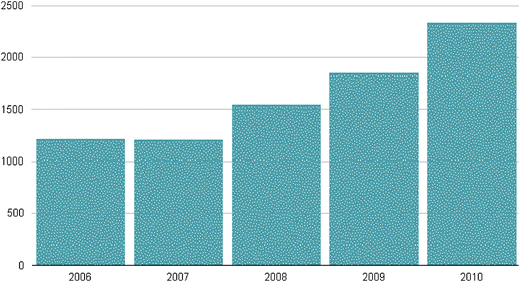 | ||
| Fig. 1 Number of high quality communications published in ChemComm (2006–2010). | ||
Complementing this significant growth is ChemComm's continued rise in IF. It now stands at an impressive 5.504 (ISI®, 2009), showing that articles in ChemComm get attention and are widely cited. The IF provides an indication of the average number of citations per article, and is calculated by dividing the number of citations in a year by the number of citeable articles published in the preceding two years.
Editorial board developments
With such a large increase in submissions, we have been working hard to keep the rapid times to publication, which have been, and will continue to be, such a unique selling point for ChemComm. To help us provide the very best customer service and set the scientific standards, we have appointed six new Associate Editors to complement our three North American Associate Editors and our dedicated professional editors located in Cambridge (see Table 1). All nine Associate Editors are leaders in their respective fields and, in keeping with the international nature of the journal, are based all over the world. Their key responsibilities are to handle communications through the peer review process and generate further high quality submissions from the chemical science community.| Associate Editor | Location | Subject Coverage |
|---|---|---|
| Can Li | China | Catalysis and spectroscopy |
| Manfred Scheer | Germany | Inorganic and organometallic chemistry |
| Jonathan Steed | UK | Supramolecular chemistry |
| Steven De Feyter | Belgium | Surface science and nanoscience |
| Jean-Louis Reymond | Switzerland | Chemical biology |
| Daniel Gamelin | USA | Inorganic materials |
We will also be looking to appoint a further two Associate Editors for ChemComm in 2011 so remember to check the new ChemComm blog (http://blogs.rsc.org/cc) for further announcements.
We would like to express our gratitude to our Editorial Board members who have just completed their terms of service with us. We send our special thanks to Professors Andrew Evans and Michael Doyle for all their efforts over the last six and three years respectively. Both have been instrumental in raising ChemComm's profile within the organic chemistry community, as well as dealing with many organic submissions as the Associate Editors for organic chemistry in North America. On behalf of the Editorial Board, we wish them every success for the future.
2010 web themes
Following the success of the first ChemComm web theme on selective catalysis in organic synthesis in 2009, we published a further three in 2010. First to appear was the chemical biology collection, focused on enzymes and proteins, guest edited by Editorial Board members Wilfred van der Donk and Nicholas Turner and Advisory Board member Herbert Waldmann. This has generated a great deal of interest, with 38 communications already published. This was followed by the carbon nanostructures web theme, guest edited by Editorial Board member Nazario Martín (Madrid), with assistance from Professors Dirk Guldi (Erlangen) and Luis Echegoyen (Texas). The final collection for 2010 focused on the highly topical area of hydrogen, in particular storage, generation and activation and is guest edited by Ferdi Schüth (MPI, Mülheim), Daniel DuBois (Pacific Northwest National Laboratory), Mary DuBois (Pacific Northwest National Laboratory) and Douglas Stephan (Toronto). The carbon nanostructures and hydrogen web themes have brought an additional 19 and 23 high quality communications to the journal. All of these web themes are ongoing and we expect them to grow in size as more high quality invited contributions are received. The publication of topical web themes will continue in 2011 with more details provided later in this Editorial.The fourth ChemComm symposium
ChemComm has always been eager to foster collaborations with our international colleagues. With this in mind, the fourth ChemComm Symposium took place in October 2010 in Japan and Korea covering the exciting topic of metal–oxygen bioinspired chemistry (MOBIC). Through the generosity and expert organisation of both local hosts, Professors Shunichi Fukuzumi (Osaka University) and Wonwoo Nam (Ehwa Women's University), the two symposia were a tremendous success, with a broad spectrum of science presented by both world-leading and emerging researchers. Representing ChemComm, we were delighted that Professors Luet Wong (Oxford) and Adrian Mulholland (Bristol) were able to speak on experimental and theoretical aspects of cytochrome P450. ChemComm Editorial Board member Jonathan Sessler also spoke at both symposia. On behalf of the Editorial Board, we would like to thank everyone that took part in these symposia.ChemComm—the home for emerging investigators
So what is there to look forward to in 2011?The ChemComm Editorial Board has always been particularly keen that the journal supports researchers in the early stages of their independent careers. Over the years, through a series of sponsored activities and prizes, we've strived to make ChemComm the home for emerging investigators. In 2011, this will certainly continue but with the addition of several other high profile activities to further engage and promote this community.
How better to start 2011 than with this first issue of the year? With over 130 communications and five feature articles, this issue is dedicated to emerging investigator research from across the broad field of the chemical sciences, a first of its kind for ChemComm.
Figure 2 shows the geographical breakdown of articles published in the Emerging Investigator issue. The issue is truly international—19 countries are represented—and it was a pleasure to see the enthusiastic response of the young generation of leading researchers. We would also like to thank all Editorial and Advisory Board members for their author suggestions. Work has already started for the second Emerging Investigator issue, scheduled to be published in early 2012.
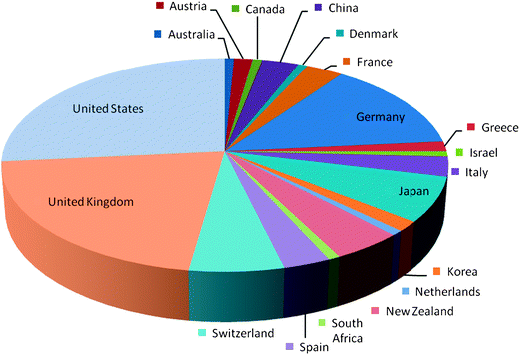 | ||
| Fig. 2 International nature of the Emerging Investigator issue. | ||
In addition to the issue, we are delighted to announce the creation of the ChemComm Emerging Investigator Award for 2011. Researchers who are within nine years of their postgraduate degree are eligible for nomination. The inaugural winner will be selected by the Editorial Board and announced in April 2011. The winner will be invited to present, in 2011, three lectures as the ChemComm Emerging Investigator. The location of the lectures will be selected following discussions with the recipient and the ChemComm Editor.
Finally, ChemComm is pleased to be sponsoring the new Cram, Lehn, Pedersen Emerging Investigator award in supramolecular chemistry. The inaugural award will be presented at the International Symposium on Macrocyclic and Supramolecular Chemistry (ISMSC) in Brighton, UK in July. This is an ongoing sponsorship, with nominations for the 2012 award, which will be presented at the 2012 ISMSC meeting in New Zealand, opening in January 2011. This collaboration further supports the Editorial Board's vision for ChemComm to become the home for emerging investigators.
Even more web themes for 2011
In the coming months, we will publish another series of web themes covering cutting edge topics from across the chemical sciences. Topics already invited for 2011 include surface enhanced Raman spectroscopy guest edited by Professors Duncan Graham (Strathclyde), Richard van Duyne (Northwestern) and Zhong-Qun Tian (Xiamen), and the latest developments in supramolecular chemistry, guest edited by Editorial Board members Jonathan Sessler and Jonathan Steed and Advisory Board member Philip Gale. Further web themes are in the pipeline and will be announced in due course.The fifth ChemComm symposium
The fifth ChemComm symposium will take place in May 2011 covering the subjects of organic chemistry and catalysis. The three symposia will be held in Kyoto, Japan, before moving to Lanzhou and Nankai in China. In each venue, there will be a mixture of high quality local and national speakers supported by three ChemComm international speakers. We are delighted that Dr Veronique Gouverneur (Oxford), Editorial Board member Ben Feringa (Groningen) and Professor Viresh Rawal (Chicago) have all agreed to represent the journal at the fifth ChemComm symposium in 2011. So watch out for the full programs and schedules which will be available soon.International Year of Chemistry 2011
On request by UNESCO, the UN has proclaimed 2011 as the International Year of Chemistry (IYC) and has asked IUPAC to coordinate the events. The aims of the IYC are to increase the public appreciation of chemistry in meeting world needs; to encourage interest in chemistry among young people; and to generate enthusiasm for the creative future of chemistry (see: http://www.chemistry2011.org/).The RSC enthusiastically endorses the IYC 2011, supporting this important initiative through a series of events and activities.
ChemComm will be supporting IYC 2011 in a number of ways. As well as registering all 2011 web theme issues and the Emerging Investigator issue as official IYC activities, we are introducing the Highlights in Chemistry series. Written by leaders in their respective fields, the aim of these short, review-style articles is to highlight the most significant chemical advances since the millennium, stressing their importance to the chemists of today and the future. The first, written by Advisory Board member Philip Gale, appears in issue 1 and discusses the latest developments in anion complexation and its potential applications in organocatalysis and nanotechnology.
One last thing…
Don't forget that you can keep up-to-date with all the latest ChemComm developments including web themes, awards, new board members, highlights and much more, by following us on Twitter (http://www.twitter.com/chemcommun), the ChemComm blog (http://blogs.rsc.org/cc), the journal homepage (www.rsc.org/chemcomm) and, of course, our weekly e-alerts. So make sure you don't miss anything and stay tuned.Summary
2010 has been another fantastic year for ChemComm. Looking forward to 2011, we will strive to continue to publish the very best high quality science. This will be achieved with the continued support of our dedicated Associate and Professional Editors. We are also committed to supporting emerging investigators through awards and, of course, this inaugural Emerging Investigator issue. We, therefore, look forward to working with these researchers throughout the whole of their careers. Finally, we would like to thank all our Editorial Board members for their efforts over the last year and, most importantly, thank all our dedicated authors, readers and referees who are absolutely vital for the future success of ChemComm.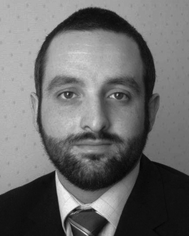 | ||
| Plate1 Dr Robert Eagling, Editor | ||
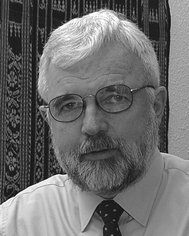 | ||
| Plate2 Professor Peter Kündig, Chair | ||
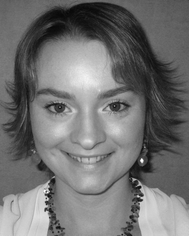 | ||
| Plate3 Kathryn Atkinson, Senior Publishing Editor | ||
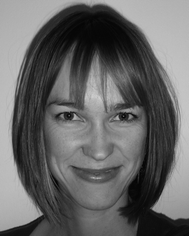 | ||
| Plate4 Joanne Thomson, Deputy Editor | ||
RSC Publishing
Quality and growth continues
It's quality that really matters at RSC Publishing. And the 2009 Journal Citation Reports® proved that our quality is better than ever as our average IF rose from 4.9 to 5.4. It's an impressive figure, especially when compared with the average for a chemistry journal of 2.4.But we don't rely on just one or two titles to boost our average. It's our entire collection that counts: of the top 20 journals in the multidisciplinary chemistry category, 25% are from RSC Publishing; and 90% of our titles have an IF over 3.
Our list of titles continues to grow: Food & Function and Catalysis Science & Technology are the latest titles to join our expanding portfolio. Plus, the number of articles we've published has increased by 74% in the last 2 years alone. We remain committed to providing a world-class publishing service to our authors, and delivering cutting-edge chemical science to readers throughout the world.
The IF and article growth figures provide a clear indication that more researchers than ever before are recognising journals from the RSC as a key resource to access the very best research.
2011 books
With steady front-list growth and cutting-edge content, delivering excellence and authority, the RSC is one of the world's leading chemical science print and online book publishers.With nearly 1000 eBooks equating to one third of a million pages, the RSC eBook Collection delivers outstanding online research and opinion in a multitude of areas of the chemical sciences. Nine new RSC eBook Subject Collections offer additional flexibility.
With over 90 new print titles planned for 2011, including: second editions of seminal texts; and new RSC Polymer Chemistry and RSC Metallobiology series launching, our contribution to chemistry collections worldwide is diverse, topical and high impact. Expect another first class collection of best selling chemical science titles in 2011.
New RSC Publishing platform
Access one million journal articles and book chapters in one simple integrated search.The new RSC Publishing Platform has been developed in consultation with the international scientific and librarian community. Together we have identified the best and most valued interface and features that connects you with the highest quality scientific research. With one single search box, easily access our books, journals and databases for students, academics, researchers, scientists and professionals.
Free online access
Free online access is available to all our newest journals, and more—all you need to do is register for an RSC Publishing personal account. Then, when you are logged in, you will be able to access all our free content. Currently this includes:• All content of our newest journals for the first two volumes.
• Any articles that are part of a special free access promotion (e.g. ‘hot’ papers, web theme issues, etc.)
• All journal content published more than two years ago (dating back to 1997)
• A sample chapter from each book in the RSC eBook Collection
• With your username and password you can access the free content any time, any place—all you need is internet access. Register at www.rsc.org/personalregistration.
• If your institution is a current customer with IP registered, you will be able to access all free content. Other institutions can apply for free online access to our newest journals using our online form: www.rsc.org/freeaccess.
ChemSpider
Have you heard about the RSC's award winning chemical structure and text based search engine – ChemSpider? It's FREE!ChemSpider provides access to:
• millions of chemical structures
• an abundance of additional property information
• tools to upload, curate and use the data
• a multitude of other online services like the RSC Publishing Platform
ChemSpider is one of the richest single sources of structure-based chemistry information. Visit www.chemspider.com (for mobile devices: cs.m.chemspider.com)
RSC 2011 conferences and events
As a learned society hosting more than 300 international conferences and events, the following have been outlined as areas you may find of interest. Visit www.rsc.org/ConferencesAndEvents to view the complete schedule of events for 2011.EICC-1: First EuCheMS Inorganic Chemistry Conference, Manchester, UK, 11–14 April
6th International Symposium on Macrocyclic and Supramolecular Chemistry (6-ISMSC), Brighton, UK, 3–7 July
10th International Conference on Materials Chemistry (MC10), The flagship event of the Materials Chemistry Division, Manchester, UK, 4–7 July
Challenges in Renewable Energy (ISACS4), Boston, USA, 5–8 July
22nd International Symposium: Synthesis in Organic Chemistry Cambridge, UK, 11–14 July
Challenges in Chemical Biology (ISACS5), Manchester, UK, 26–29 July
Challenges in Organic Materials & Supramolecular Chemistry (ISACS6), Beijing, China, 2–5 September
| This journal is © The Royal Society of Chemistry 2011 |
